
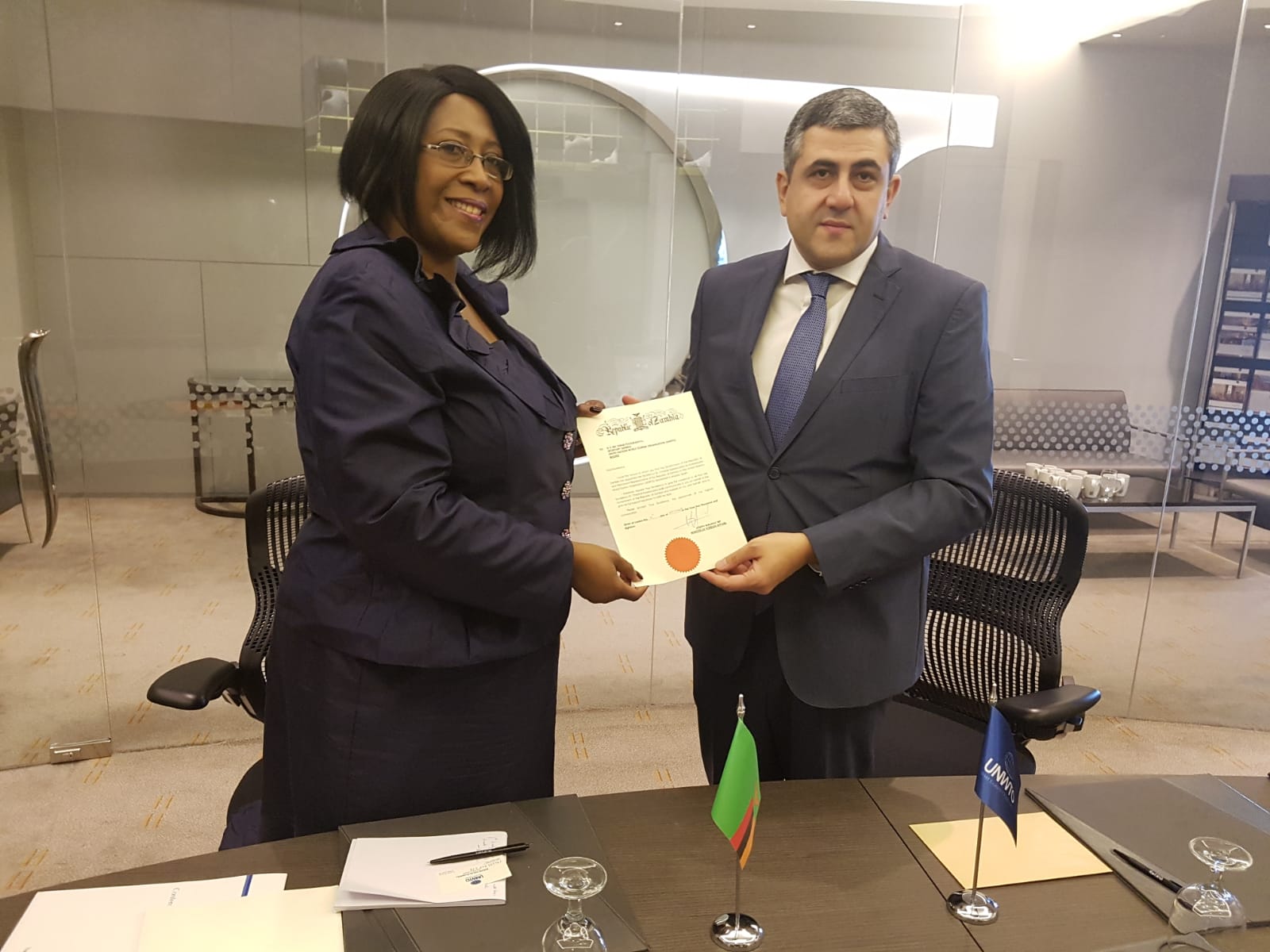
Zambia new Chair of UNWTO Executive Council
Zambia has assumed chairmanship of the world global tourism body’s executive council during the current session of meetings taking place in Manama, Bahrain.
Ambassador Designate Extraordinary and Plenipotentiary to France, Dr. Christine Kaseba, has presented her Letters of Credence to the United Nations World Tourism Organization (UNWTO) Secretary-General, Zurab Pololikashvili, at a special session in Bahrain.
Zambia becomes the second African country since 2010 to chair the UNWTO Executive Council with Ambassador Kaseba, the Permanent Representative to the UNWTO, leading proceedings at the ongoing 109th session on behalf of Tourism, Arts and Culture Minister Mr. Charles Banda.
During her presentation of credentials held on Tuesday, October 30, 2018, Ambassador Kaseba acknowledged the organization’s management vision and priorities of making tourism a key sector for the 2030 Agenda based on smart, competitive, and responsible tourism for sustainable development.
Ambassador Kaseba said the government has identified tourism, arts, and culture as some of the priority growth sectors of the national economy towards development in the National-Vision 2030 aimed at turning Zambia into a “prosperous middle-income country by the year 2030.”
She is the former First Lady, wife of the late President Sata.

The Ambassador added that tourism had also been identified as one of the priority areas for investment due to its numerous forward and backward linkages to various other sectors of the economy.
Receiving the Letters of Credence, the UNWTO Secretary-General expressed interest to visit Zambia and further pledged to enhance multilateral relations with the country.
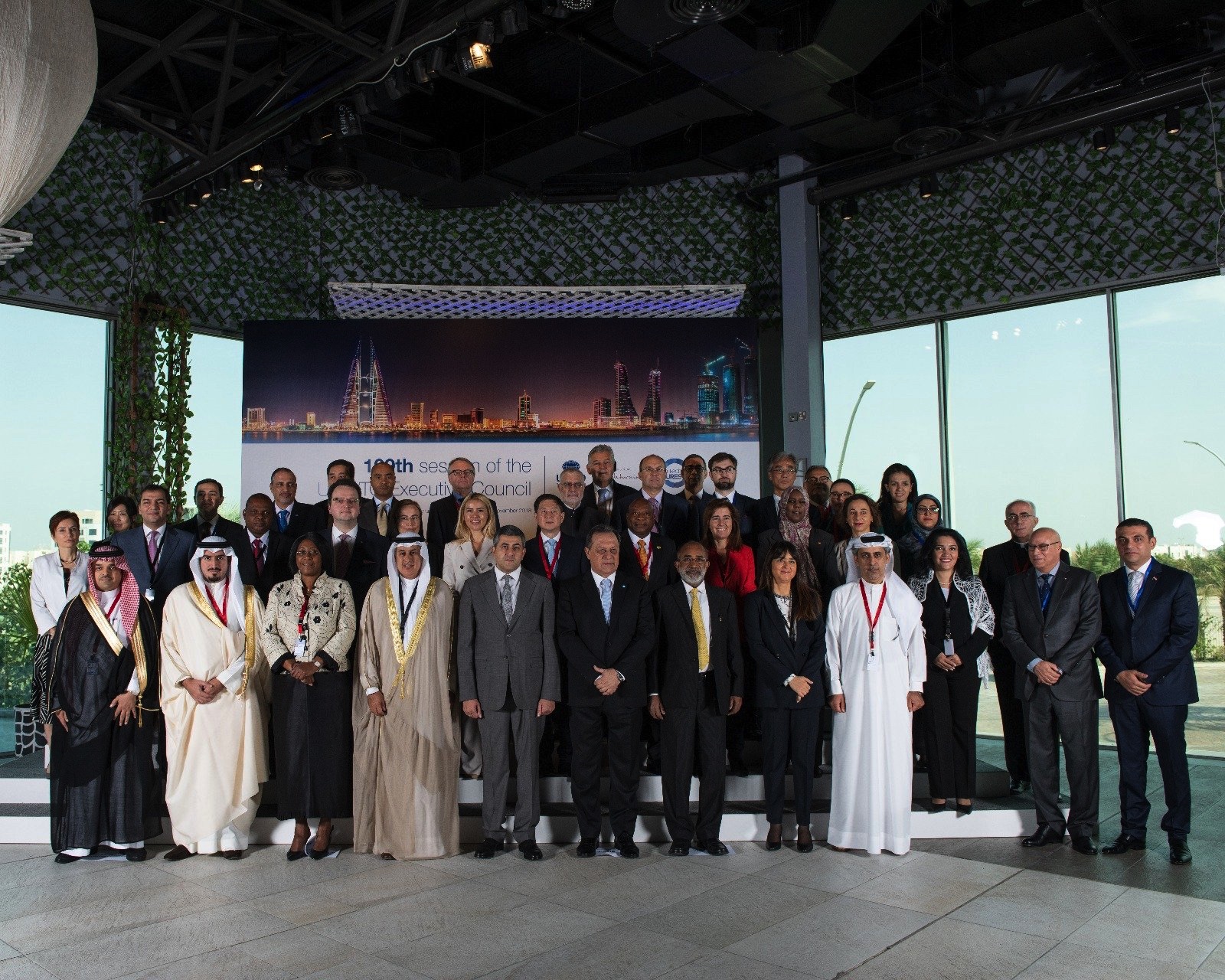
UNWTO Agenda receives strong support at Executive Council
The World Tourism Organization (UNWTO) concluded its 109th Executive Council session in Manama, Bahrain today, with Members showing appreciation both for progress made under the 2018 institutional priorities and for the Organization’s financial stability and restructuring process. Tomorrow UNWTO will also introduce a forum named ‘Tourism Tech Adventure: Big Data Solutions, bringing together the ‘ecosystem’ of tourism innovation and raising the sector’s role in the digital agenda.
A successful 109th session of the UNWTO Executive Council brought with it much appreciation of the Organization’s efforts in 2018. A number of Member States expressed great support for UNWTO’s efforts to prioritize tourism in the 2030 Agenda for Sustainable Development. The executive management team was praised for creating a cleaner structure more equipped to effectively respond to Members’ requests, as well as the clear management priorities and sharp focus placed on UNWTO’s work areas of education and digital transformation.
A mere ten months into the new mandate, UNWTO was able to communicate showing a financial surplus. At this point in the year, the Organization has received higher contributions than in the last three years and the highest percentage of budgetary income since 2014, with expenditure also on target.
UNWTO’s Secretary-General Zurab Pololikashvili gave thanks to Bahrain, the host country for the proceedings. “Being hosted in Bahrain is very relevant. Here you can see how innovation and being a smart destination can be positioned high on the political and economic agenda, and how supporting tourism education and capacity building is a sound investment”, he said.
On the margins of the Council UNWTO held a high-level workshop on data-driven tourism management. The Organization has introduced a new forum, ‘Tourism Tech Adventure: Big Data Solutions’, where panellists debate how open data platforms are revolutionizing tourism, along with how to stimulate venture capital and greater gender equality in tourism and technology.
‘Tourism Tech Adventure: Big Data Solutions’ will also welcome another round of pitches for finalists of the 1st UNWTO Tourism Startup Competition in Collaboration with Globalia, launched in June 2018 to identify companies that can foster the sector’s digital transformation. The finalists’ projects will be presented at the next International Tourism Fair of Madrid (Fitur) in January 2019.
The forum serves as a follow-up to the official World Tourism Day 2018 celebrations on 27 September in Budapest, Hungary, under the theme of ‘Tourism and the Digital Transformation’, and a precursor to the upcoming UNWTO and World Travel Market ministerial summit in London, UK (6 November) on investment in tourism technology. All are part of UNWTO’s ongoing strategy to give tourism its deserved prominence on the digital agenda. Secretary-General Pololikashvili signed cooperation agreements during the Executive Council with the tourism authorities of Argentina and Portugal to strengthen UNWTO’s cooperation agenda on innovation in tourism.
Mr. Pololikashvili announced during the Council that UNWTO governing bodies’ meetings will have a specific overarching thematic focus each year. After 2018’s focus on digital transformation, 2019 will look at employment and education in line with the theme of World Tourism Day 2019: ‘Tourism and Jobs: a better future for all’.

WTTC applauds Senators Blunt and Warner on their commitment to Travel & Tourism
Today, the leaders of the World Travel & Tourism Council (WTTC) joined and applauded Senators Roy Blunt (R-MO) and Mark Warner (D-VA) for their commitment to Travel and Tourism and its role in creating jobs and driving economic growth in the United States.
The two Senators jointly met with the 30-strong Executive Committee of the WTTC as part of its annual meeting in Washington, DC on October 30th. The Senators discussed the role of Travel & Tourism in the United States – the world’s biggest Travel & Tourism economy. Furthermore, the group discussed:
- Continuing support for inbound international travel and for Brand USA, America’s destination marketing organization;
- Deploying biometric technologies to ensure safe, efficient and seamless cross-border travel;
- Opportunities to maximize the industry’s economic potential by promoting job training and apprenticeship programs.
Commenting on the event, Gloria Guevara, President & CEO, WTTC, said: “I would like to thank Senators Roy Blunt and Mark Warner for the time they have devoted to the WTTC Executive Committee. Their leadership on critical Travel & Tourism issues in the United States Senate is commendable and will help drive our mission forward.”
“We are truly living in a Golden Age of Travel, with nearly 77 million international visitors to the United States last year who spent a record-setting $251 billion,” said Chris Nassetta, Chairman of WTTC and President and CEO of Hilton.
“Senators Warner and Blunt have been great champions of Travel & Tourism because they understand the positive economic impact our industry has had on their states and the country as a whole.”
WTTC represents the global leaders of private sector Travel & Tourism companies which between them account for two-thirds of a trillion US dollars in turnover; its Executive Committee consists of the Chairs, Presidents and CEOs from companies from across the world.
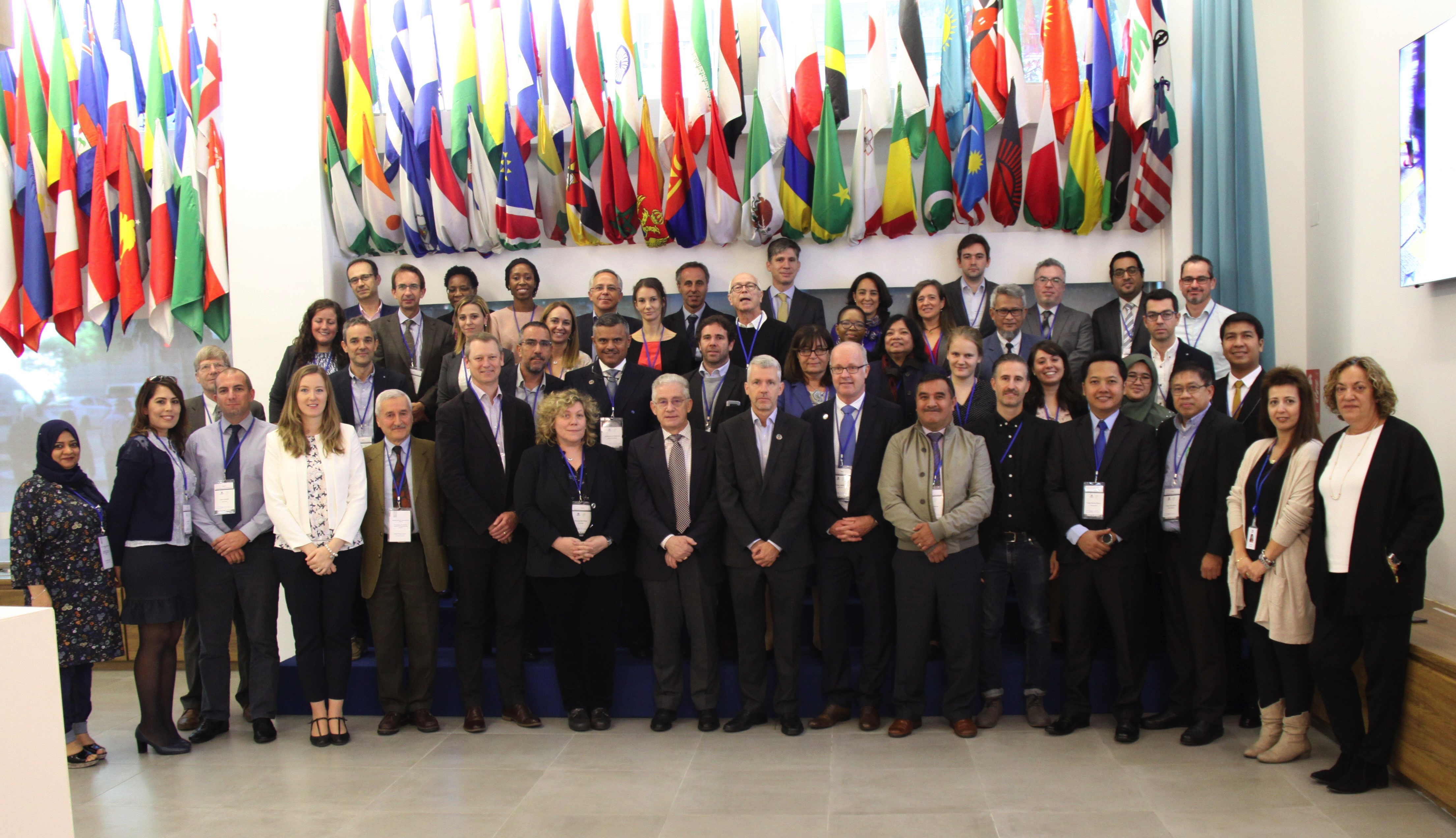
UNWTO: Sustainability set to shape new standard of tourism statistics
The World Tourism Organization’s (UNWTO) initiative Measuring the Sustainability of Tourism (MST) received a boost last week when its working group met in Madrid (24-25 October). After successful pilot studies to produce credible and comparable data, the initiative is on track with its aim of getting the MST framework adopted as the third international standard on tourism statistics.
The group of experts creating a statistical framework for Measuring the Sustainability of Tourism met to establish the MST initiative’s major goals for 2019. The initiative is creating a draft framework for a data standard for tourism’s impact on sustainability and plans to have it adopted as the third international standard on tourism statistics by the UN Statistics Commission (UNSC).
Among the areas of discussion during the group’s meeting on 24-25 October were summarizing the pilot studies done in Germany, Philippines and Saudi Arabia to test MST’s relevance, and which have shown feasibility of the proposed framework in three different national contexts. This means the MST framework is on track to be prepared for submission as an international standard.
For 2019 the MST working group has tasked itself with refining and documenting three statistically-based tourism indicators to monitor the Sustainable Development Goals (SDGs) and their targets. UNWTO is the custodian agency of these three indicators, and coordinates the development of tourism-related indicators with countries and UN agencies. The next step will then be to present this draft framework in UNWTO’s 2019 meetings of its governing bodies.
Background to the MST framework
Statistical frameworks enable countries to produce data that is credible and comparable across countries, time periods and other standards. MST is a UNWTO-led initiative for a statistical framework for tourism, supported by UNSC since March 2017. Its roadmap was set in the 6th International Conference on Tourism Statistics, held in June 2017 in Manila, Philippines.
In order to develop tourism potential, better manage the sector, and support effective evidence-based policy decisions, there is a need to better measure tourism using high-quality official statistics covering economic, social, and environmental sustainability. MST aims to expand existing tourism measurement beyond its primarily economic dimension to also measure social and environmental dimensions.
It aims to link UNSC’s System of Environmental-Economic Accounting with the Tourism Satellite Account framework, which is one of the two existing official frameworks for measuring tourism. The other is the International Recommendations for Tourism Statistics. Both were developed and proposed to UNSC by UNWTO. A similar process is planned for MST.

WTTC: Seamless biometric technology will transform traveler experience
Passengers will be able to move more efficiently, faster and securely through every part of the travel experience after the World Travel & Tourism Council (WTTC), the body which represents the global private sector for Travel & Tourism announced a series of pilot schemes to test the use of biometric technology throughout the end-to-end passenger journey.
In first half of 2019, passengers will be able to trial the application of biometric technology at every stage of the travel process – from the point of booking, check-in, through airports, airline boarding, border management, car hire, hotel, cruise and during the journey.
In a series of pilot schemes being facilitated by WTTC, under its Seamless Traveler Journey initiative, representatives from several industries within the Travel & Tourism sector, such as airlines, airports, hospitality, cruise, car rental, and tour operators, will be able to jointly test different technologies that interconnect and work to improve the experience of the traveler.
The first pilot will see travelers on round-trips between Dallas Fort Worth International Airport or London using biometric technology to conduct all airline security, airport and border processes before accessing car rental and hotel check-in using the same biometric information.
WTTC is working with American Airlines, Dallas Fort Worth International Airport, Hilton, and MSC Cruises on plans for this first step towards the immense task of changing how people will travel which will have profound benefits for the traveler and the future of the industry. All of these corporations and the members of WTTC share a commitment to making the travel process safer and more efficient through the use of biometric technology.
WTTC has also invited the United States Customs and Border Protection and UK Border Agency to collaborate on the first pilot.
Consulting firm Oliver Wyman is supporting WTTC with the overall Seamless Traveler Journey program.
Gloria Guevara, President & CEO, WTTC, said: “In 2019 travelers between Dallas Fort Worth International Airport and London will be able to experience the future of travel. Our vision is that the traveler won’t need to provide the same information or passport multiple times. Instead, their experience will be seamless, faster and more enjoyable throughout their entire journey. Biometrics will work at every touchpoint of the journey to make travelling easier for the passenger while providing border services with greater security.
“99.9% of travelers are considered low risk. By using technology to minimize queues, we can give low-risk travelers more time to enjoy the travel experience. These travelers, by using technology, will be able to spend their time enjoying the experience, shopping at airports or more time at destinations rather than worrying about long queues.
“Travel & Tourism employs one in ten people on the planet today and over the course of the next 20 years we will witness a doubling of the number of travelers and the creation of as many as 100 million jobs around the world. We have a responsibility to prepare for the future by transforming the traveler experience while increasing security by working together and with governments.”
Chris Nassetta, Chairman of WTTC, and President & CEO of Hilton, added, “In our industry, our customers are at the heart of everything we do – we are always looking for new ways to offer them exceptional experiences. In the near future, travelers will begin to see biometric technologies that will enhance many elements of their journey from start to finish. Thanks to the support of our partners around the world, WTTC is helping create seamless experiences for travelers, encouraging the sustainable growth of travel and tourism.”
Sean Donohue, CEO of Dallas Fort Worth International Airport, said “As we look ahead to transforming the customer experience through technology and personal touchpoints, we’re pleased that DFW is part of this industry-leading effort. International airports are uniquely positioned in the customer journey, providing a key connection between air and ground transportation, hotels, and government agencies. We’re confident the WTTC pilot program will lead to an even better customer experience and more efficiencies for businesses and agencies across the travel and tourism industry.”

The 12th UNWTO/PATA forum looks into the future of tourism
The World Tourism Organization (UNWTO), the Pacific Asia Travel Association (PATA) and the People’s Government of Guilin, China held the 12th UNWTO/PATA Forum on Tourism Trends and Outlook on 25-27 October 2018. This year’s edition – ‘The Future of Tourism: Road to 2030´, aligns with the 2030 Agenda for Sustainable Development and the Sustainable Development Goals (SDGs).
“Digital advances provide opportunities to tourism in order to enhance inclusiveness, community empowerment and efficient resource management to achieve the SDGs. Yet to do so, we need to better understand where tourism is heading so we can adopt the adequate policies and business strategies.” said UNWTO Executive Director Shanzhong Zhu at the event.
International tourist arrivals in Asia and the Pacific grew 6% in 2017 to reach a total of 323 million. Rapid economic growth in emerging economy markets, rising air connectivity, more affordable travel and enhanced visa facilitation continue to fuel tourism from within and outside the region. Asian destinations earned USD 390 billion in international tourism receipts in 2017, 29% of the global figure, a share that has steadily increased from 17% in 2000. China, the world´s top spender in international tourism and fourth largest destination, has been one of the main drivers behind this growth.
Dr. Ian Yeoman, travel and tourism futurologist, delivered the keynote speech on the future of tourism, highlighting the importance of societal behaviours towards a sustainable future and the distribution of wealth generated by tourism, as main drivers of change.
Furthermore, topics covered at the Forum included how digital advances and data can be used to support sustainable tourism for development. Presentations were made by Google, TripAdvisor, Vynn Capital, STR, the European Travel Commission as well as research and policymakers from across different countries in Asia and the Pacific. The Forum concluded by emphasising the need for transformation and seize the opportunities brought by innovation and technology to move sustainability to the next level.
The 12th UNWTO/PATA Forum on Tourism Trends and Outlook drew more than 220 experts from 22 countries, among which representatives from National Tourism Administrations, National Tourism Organizations, tourism businesses and academics. With the longstanding collaboration of the Hong-Kong Polytechnic University, the Forum has become over the last 12 years a reference platform on global and regional tourism trends.
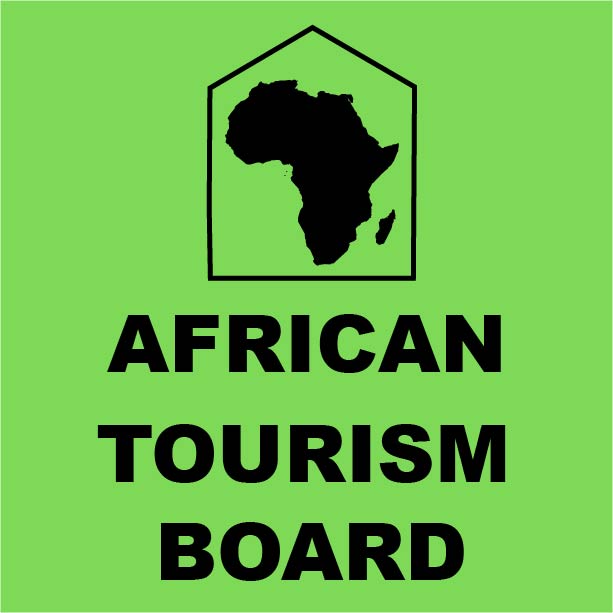
Reshaping African Tourism at World Travel Market in London
The African Tourism Board soft launch at the upcoming World Travel Market (WTM) in London wants to bring Africa together and take tourism leadership home with one goal in mind: “Where Africa becomes one tourist destination.”
African travel and tourism leaders are expected to meet at WTM on Monday, November 5, 2018 at 1400 hours at North Gallery Room 4 at the Excel Exhibition Center to participate in the soft launch of the African Tourism Board (ATB).
The soft launch is sponsored by Carol Weaving, managing director of Reed Exhibitions, who is one of the new board members of ATB. The event is co-sponsored by a prominent figure who doesn’t yet want to be named.

Attending Ministers of Tourism from across Africa, CEOs of tourism boards, and leaders of the private travel and tourism industry in Africa and around the globe are expected to share their stories. Global tourism celebrities, including Dr. Taleb Rifai, former UNWTO Secretary-General, confirmed attendance. It’s expected Dr. Rifai will share information on the outcome of the International Tourism Investment Launch in London. Rifai is the Chairman, and their launch event is scheduled for November 2 in London. ATB will be an observer at the International Tourism Investment Launch event.
ITIC is designed to serve as a unique global investment platform that will bring together investors, private equity firms, bankers, family offices, law firms, and technology experts alongside tourism policy-makers and ministers, experts, CEOs from the public and private sectors, and tourism entities as one tourism-focused business community to unlock opportunities for tourism countries strongly reliant on tourism as a foundation for national growth and development.
Where Africa becomes one destination is the theme for the African Tourism Board. Topics at the soft launch will include global tourism outreach, travel, tourism security, investments, Internet access in Africa, aviation connectivity, sustainability, marketing, and building a “friends of the media” platform.
The full agenda will be announced Wednesday. A sneak preview:
 Former Seychelles Minister of Tourism, Alain St. Ange, will speak about “Africa rewriting its narrative to re-position itself as a relevant tourism destination.”
Former Seychelles Minister of Tourism, Alain St. Ange, will speak about “Africa rewriting its narrative to re-position itself as a relevant tourism destination.”
Professor Geoffrey Lipman, co-founder of SUNx and President of ICTP (International Coalition of Tourism Partners), will introduce a never-announced concept, “Climate-friendly Travel for Africa,” and a scholarship opportunity for African youth.
Graham Cooke, head of World Travel Awards, will be explaining the upcoming partnership between World Travel Awards and the African Tourism Board.
Carol Weaving, Managing Director of Reed Expo, will deliver her views on why forming the African Tourism Board is timely.
ICTP Chairman Juergen Steinmetz will shed light on why the Hawaii, Brussels, Seychelles, and Bali-based International Coalition of Tourism Partners started the African Tourism Board. He will share his vision on where ATB could go, and when ATB will be officially launched. He will introduce an initial steering committee and board ready to take the African Tourism Board home to Africa and to the next step on its path to help the continent to become one powerful and sustainable travel and tourism destination.
Registration for the ATB soft launch event is open. Space is limited.
Click here to register.
Founded in 2018, the African Tourism Board is an association that is internationally acclaimed for acting as a catalyst for the responsible development of travel and tourism to and from the African region.
The African Tourism Board is part of the International Coalition of Tourism Partners (ICTP)
The Association provides aligned advocacy, insightful research, and innovative events to its members.
- In partnership with private and public sector members, the African Tourism Board enhances the sustainable growth, value, and quality of travel and tourism to, from, and within Africa.
- The Association provides leadership and counsel on an individual and collective basis to its member organizations.
- The Association is expanding on opportunities for marketing, public relations, investments, branding, promoting, and establishing niche markets.
More information and how to join the African Tourism Board can be found at africantourismboard.com.
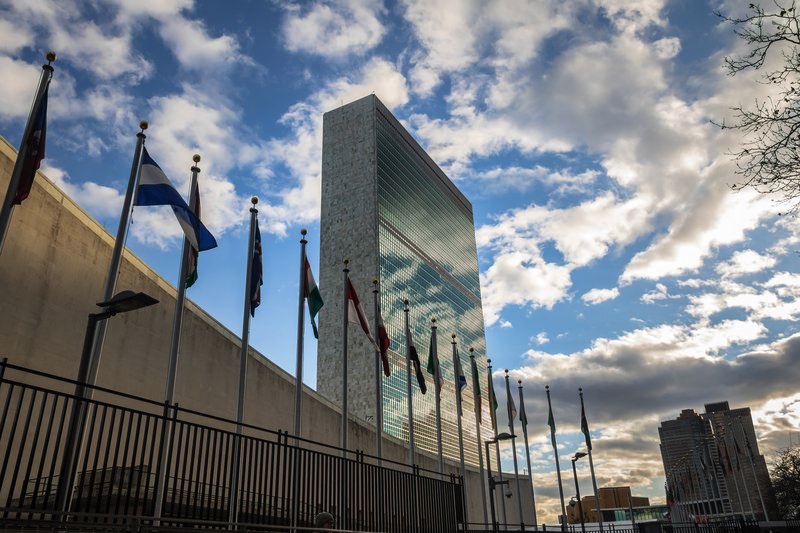
New UNWTO Global Report on Inclusive Tourism Destinations launched on the occasion of UN Day 2018
A new report by the World Tourism Organization (UNWTO), produced in collaboration with UNWTO Affiliate Member globaldit, presents a model for inclusive tourism destinations. ‘Global Report on Inclusive Tourism: Model and success stories” is launched on the occasion of the UN Day 2018 celebration in Madrid, Spain.
Modelling inclusive tourism destinations on the capacity of tourism to integrate disadvantaged groups and benefit from its activity, is at the centre of this report. Showcasing how tourism can function as a vehicle for sustainable development, and the reduction of poverty and inequality, in the context of the 2030 Agenda and the 17 Sustainable Development Goals (SDGs).
The Model for inclusive tourism destinations presented in this Global Report contributes directly to SDG 8 – Decent work and economic growth and SDG 10 – Reduction of inequalities; but also SDG 5 – Gender equality and SDG 17 – Global partnership for sustainable development.
“As globalization, interconnectivity and a growing middle class leads to ever more people travelling, the world will continue seeming to get smaller and inclusion will become even more of a priority,” said UNWTO Secretary-General Zurab Pololikashvili. He added that this publication “will serve as an important tool for the tourism community to create and promote inclusion in destinations, and a valuable reference for all tourism stakeholders in developing best practices for a more inclusive sector”.
In addition, this report highlights the need to foster discussion on and examine new approaches to inclusive tourism in order to drive tourism’s long-term sustainability.
Various experts from organizations in the field of tourism and the SDGs contributed to this report: the Ashoka Foundation, the Global Sustainable Tourism Council, Google, IE University, PREDIF, the SDG Fund, Airbnb, Vinces, Walhalla DCS and Ekin Consulting. It also features success stories from a variety of stakeholders, such as the Gauteng Tourism Authority, Mekong Tourism Coordinating Office, CENFOTUR, Korea Tourism Organization, VisitScotland, Chemonics and the State of Michoacán, Mexico.
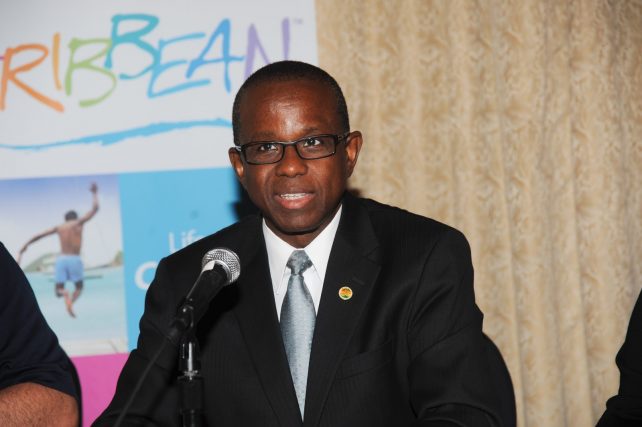
Caribbean Tourism: Complacency puts Caribbean people and economies at risk
Secretary General of the Caribbean Tourism Organization (CTO) Hugh Riley has called on Caribbean states to take tsunami preparedness seriously, stating to do otherwise would put the people and regional economies at risk.
Speaking in Paris, France, during a discussion organised by the United Nations Educational, Scientific and Cultural Organization (UNESCO) to raise awareness of the threats posed by tsunamis, Riley insisted that Caribbean countries risked paying the price for complacency.
He stressed with the Caribbean being comprised mainly of low-lying states, and with most tourism assets and hotel investments located at or near coastal areas, the tourism sector is extremely vulnerable to the threat of tsunamis.
“Tourism is the main economic driver of the Caribbean, representing 80 per cent of the region’s gross domestic product and more than one million jobs so we cannot ignore a tsunami risk,” he told fellow panellists and the wider audience, which included representatives from Grenada, Saint Lucia and St. Vincent & the Grenadines.
“Complacency puts us in real danger and we must raise the Caribbean’s voice by advocating for our members during this important global forum,” he added.
The event was being held in advance of World Tsunami Awareness Day on 5 Nov. 2018. The secretary general noted that the region had experienced 11 tsunamis in the past, the most recent of which occurred in 2010, and six between 1902 and 1997.
He suggested that because there has been no “recent” impact on the region, tsunamis are not considered an imminent threat, therefore, they are not given sufficient attention.
He called for an increase in tsunami awareness and sensitisation of the tourism sector and the wider Caribbean community, as well as support for training by regional institutions and countries to develop preparedness and response protocols.
“The CTO recognises that tsunami preparedness is critical, which includes well-established and tested response protocols which will ultimately reduce loss of life and economic damage. We also need to enhance collaboration with countries recently and frequently impacted by tsunami hazards in order to develop best practices.”
Riley highlighted several CTO members’ tsunami readiness initiatives, including Anguilla, the first English-speaking Caribbean island to be recognised as “tsunami ready” in September 2011 and has maintained certification status. Since then the British Virgin Islands and St. Kitts and Nevis have received similar recognition, all having established emergency operating centres, national tsunami plans, public outreach and alert systems, public service information programmes and tsunami preparedness and response protocols.
The high-level panel was organised by UNESCO’s Intergovernmental Oceanographic Commission (IOC) and the United Nations Office for Disaster Risk Reduction (UNISDR) to discuss policies and practices to reduce tsunami risks in countries highly dependent on tourism revenue.
The meeting opened with a minute’s silence in memory of the 2,000 confirmed dead and 680 officially missing in the tsunami and earthquake which struck Indonesia on 28 Sept. 2018. The double disaster left almost 70,000 people homeless and 11,000 injured in the Indonesian cities of Palu and Donggala in Central Sulawesi.

Just a Drop reaches 1.5 million people with safe water
Just a Drop will celebrate its 20thanniversary and having reached 1.5 million people with safe water and sanitation at World Travel Market 2018 – the event where the charity was launched in November 1998 by Fiona Jeffery OBE, former WTM Chairman.
To mark the occasion, Just a Drop has partnered with Water-to-Go to create Just a Drop-branded eco-friendly water bottles, which provide a solution to two of the biggest problems facing the world at the moment: access to clean, safe drinking water and the pollution caused by single-use plastics.
Containing a filtration system that eliminates over 99.9% of contaminants, the water bottles will be sold exclusively on Just a Drop’s stand at WTM (BL4 on the Main Boulevard, by N4/S4) for the special anniversary price of just £5, ahead of launching online via Water-to-Go’s website. All profits will support Just a Drop’s safe water projects. Free water refills will be available throughout WTM from water stations located around the fair, including at Affordable Car Hire, Air Europa, Atta – African Travel & Tourism Association, Discover the Palm Beaches, and Just a Drop’s stands.
Anniversary celebrations will take place on Just a Drop’s stand throughout WTM. A raffle will be held with prizes including a three-course meal with champagne for two at The Ritz, London, donated by Travelzoo.
Fiona Jeffery OBE, Founder and Chairman of Just a Drop, said: ‘I’m delighted to be celebrating Just a Drop’s 20th anniversary here at WTM, where it all began. Over the past 20 years Just a Drop has grown from a volunteer organisation providing emergency relief in the wake of natural disasters to a professional NGO working with local communities to deliver comprehensive safe water, sanitation and hygiene programmes that create sustainable, long-term change and empower people to lift themselves out of poverty. Just a Drop has now reached 1.5 million people with safe water and sanitation across 32 countries. This is an achievement I did not foresee when I launched the charity in 1998, and it has been made possible largely thanks to the travel industry’s generous and dedicated support – thank you.’
On World Responsible Tourism Day, Wednesday 7th November, Just a Drop will host ‘The Changemakers: How Inspiration has Created Life Transforming Reality’. Speakers Holly Budge, Founder of How Many Elephants, Fiona Jeffery OBE, Founder of Just a Drop, Paras Loomba, Founder of Global Himalayan Expedition, and Ben Morison, Founder of The Flipflopi Project, will discuss how they realized their ideas and created organisations that are changing the world we live in for the better. The talk will be moderated by Anita Mendiratta and will take place from 2-3 pm in the Middle East & Africa Inspiration Zone – AF190.
Just a Drop was founded at WTM in 1998 by Fiona Jeffery OBE, as a way of encouraging the travel industry to give back to communities around the world. Fiona chose the cause because water is the most basic of human needs, and she felt that if everyone was encouraged to give a little, then collectively a huge difference could be made.
Just a Drop’s first ever project began in Ethiopia in 1998 and much of the charity’s work during its first ten years involved disaster relief efforts, in partnership with organisations such as the British Red Cross and the Scientific Exploration Society. By 2008, Just a Drop’s work had contributed to the number of people without safe water dropping to below 1 billion globally, and the charity grew from a volunteer organisation to a professional NGO. The following ten years up to 2018 have seen Just a Drop develop into a community development organisation that today has reached over 1.5 million people across 32 countries with much needed safe water, sanitation and hygiene.

